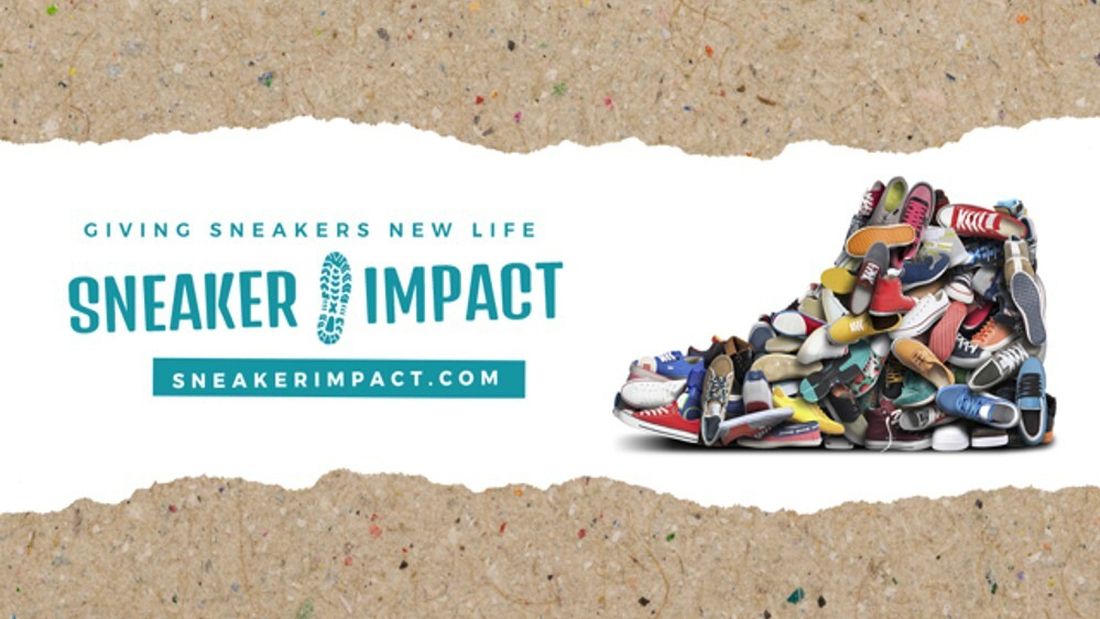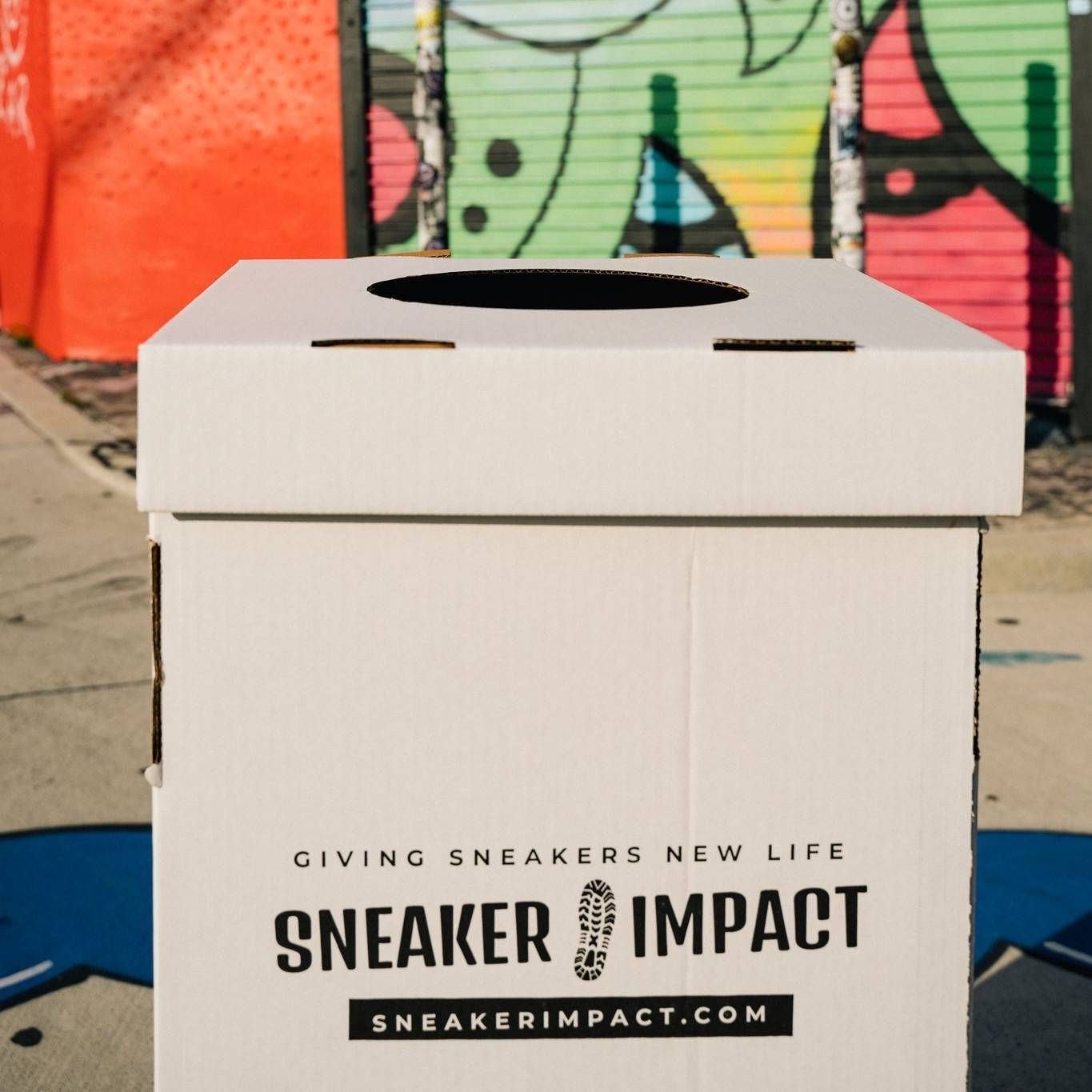Sneaker Impact Grows Circular Economy through Saving Soles


The shoes that end up in landfills take a minimum of 25 years to decompose, while the polyvinyl chloride and ethylene and vinyl acetate in them takes up to 1,000 years. Consequently, reducing the flow of shoes into landfills can have major environmental benefits, and entrepreneurs who collect shoes and keep them in a circular economy, circulating as upcycled products and recycled materials, can be part of the solution.
Sneaker Impact is one such company, which specializes in recycling shoes from run specialty stores. The company, an associate member of the Running Industry Association, participated in Runchella in May and has been showing up at other running industry events across the U.S.
Unlike some individuals and companies, who obtain shoes in good condition to resell and compete online with running stores, Sneaker Impact only ships large quantities of shoes to distributors and microenterprises in developing countries.
“Nothing we collect goes online or is sold within the United States,” said Moe Hachem, who founded Sneaker Impact almost three years ago. “We don’t compete with U.S. stores. We compete with the landfills.”
A for-profit social enterprise in Miami, Florida, the company’s motto is “Recycling Sneakers to Create Economic Opportunities.” It is part of a larger company, Coastal Export, that employs 20 people, and helps create jobs in more than 20 countries in Central and South America, Africa, and Asia.
Hachem, who lived in Africa for three years, is following in the footsteps of his father, who was a pioneer in the apparel and footwear recycling industry in Lebanon in 1967 and Europe in the 1970s. Over the decades, the father and son have shipped many tons of used clothing for upcycling in developing countries.
Coastal Export receives truckloads of used items to its 75,000 square foot warehouse daily. The operation is so innovative that Florida University sends students there to study sustainability, said Bryan Huberty, the retail accounts manager at Sneaker Impact.
Huberty is an environmental scientist by background and a competitive masters marathon runner with a recent 2:31 PB. As retail accounts manager, he provides customer service for running stores, running clubs, universities, gyms, and thousands of partners across the U.S.
“This is a full-time operation for us, not a hobby,” he explained. “It’s a free service to our suppliers of used shoes, commercial and individual, and we are committed to supporting you.”
The company provides stores with boxes for collecting shoes from customers, and pays for shipping to the warehouse. Shoes are also collected from individuals who send them free of charge in biodegradable mailers through CVS stores or FedEx, and at big events such as marathons.
“We encourage people (and store partners) to keep donating new shoes and shoes in good condition to homeless shelters and other local nonprofits,” Huberty said.
Sneaker Impact receives and processes 600,000 pounds (approximately 600,000 pairs of shoes) each month. They are inspected, separated by quality, condensed and packed into shipping containers, and sold by the pound to distributors and microenterprises across the oceans.
The company works with more than 5,000 merchants. In some cases, importers purchase and resell to local merchants, and in other cases the merchants buy directly. Then, the merchants refurbish the shoes, and sell them in their communities such as at flea markets and outside their homes.
“We don’t ship trash. We are rerouting shoes from landfills to areas of the world where sneakers are a form of transportation,” Huberty said. “We are improving community health and generating jobs. 24% of kids in the world do not have proper footwear so they can have parasites and diseases.”
Since 15% of the shoes received by Sneaker Impact cannot be exported due to not having enough life left in them, the company sends those to waste innovation plants where they are turned into energy through combustion.
Hachem admitted that’s not a perfectly sustainable solution either, but he is committed to keeping the shoes out of landfills. He is doing research and development with laser and AI technologies to separate shredded shoes into their distinct materials. Then, the recycled foam, plastic, rubber, and fabric will be available to manufacture into new products.
“We have not proven the guaranteed purity of the material separation yet. Once we have that, it will become a commodity for use in clothing, yoga mats and other products,” he said.
Huberty proudly shared that the company founder is spending a lot of money and time to invest in the future to keep shoes out of the oceans and from being buried in the earth.
“He believes there is no planet B,” the accounts manager added. “We feel like what we’re doing matters. We are impacting the world one sole at a time.”
Some content and resources may not be visible because you're not logged in. If you are a current member, use the login form below. Not yet a member? Join today!
More from the RIA
-
Letter from Executive Director
-
Q1 2026 Huddles
-
Submit Your Running Specialty Hall of Fame Nomination by February 9th
-
2026 RIA Board and Executive Team
-
Letter from the New RIA Board President
-
2026 Summit Retailer Registration is Open!
-
TRE Activations
-
A letter from the Executive Director - Never Static and Always Moving Forward.
-
November is National Run Safety Month - Learn How to Merchandise your Store
-
PDC Update: Version 2.0 Brings Major Improvements